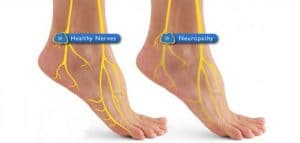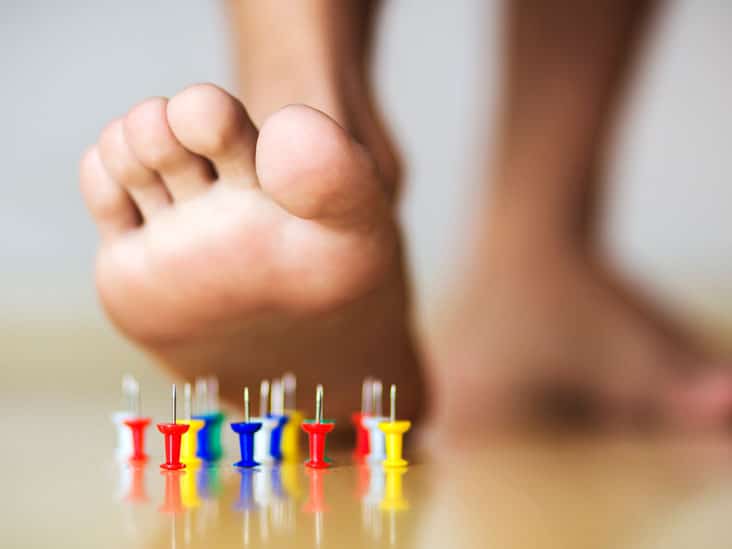Peripheral Neuropathy Treatment in The Woodlands and Houston
The Houston Spine & Rehabilitation Centers treat patients in and around Houston, TX who suffer from various forms of neuropathy. We have locations in The Woodlands, Houston, and Midtown to guarantee convenience for local residents who require our services. Neuropathy is a form of nerve pain that does not originate within the spinal cord or brain. However, it can cause significant discomfort as well as symptoms that inhibit regular activities and necessitate treatment. Our highly-trained staff can carefully diagnose and provide relief for peripheral neuropathy and autonomic neuropathy, among types of the condition. We will treat patients’ nervous systems to help restore and maintain proper function, free of debilitating symptoms. Contact us today to learn more about peripheral neuropathy treatment in the Woodlands and Houston.
Understanding Peripheral Neuropathy and its Effects

Peripheral neuropathy is sometimes called distal symmetric neuropathy or sensorimotor neuropathy. It is the result of damage to the peripheral nerves, which comprise those outside of the brain and spinal cord. The peripheral nervous system is responsible for sending information from the central nervous system to the rest of the body. It also sends sensory information back to the nervous system. Traumatic injuries, metabolic problems, infections, exposure to toxins, and genetics can cause peripheral neuropathy. Because it affects your sensory nerves, peripheral neuropathy’s symptoms include:
- Numbness, prickling, or tingling in hands
- Sharp, throbbing, or burning pain
- Poor coordination
- Muscle weakness
- Extreme sensitivity to touch
- Shaking and lightheadedness
Patients in and around Houston, TX should seek treatment from The Houston Spine & Rehabilitation Centers at the first sign of peripheral neuropathy. If left untreated, reflexes can continue to slow, the pain will worsen, and everyday activities like walking will become more challenging. A person’s feet and legs will likely exhibit symptoms of peripheral neuropathy before his or her hands and arms do.
The Impact of Diabetic Neuropathy
Peripheral neuropathy and autonomic neuropathy are both forms of diabetic neuropathy. High blood sugar levels can damage nerves throughout the body, most prominently the nerves in one’s legs and feet. As a result, sufferers experience tingling in their hands and feet as well as problems with their digestive systems, urinary tracts, and hearts. Though it is a serious complication of diabetes, neuropathy is common among people with diabetes. The medical experts at The Houston Spine & Rehabilitation Centers can help manage the symptoms and reduce their impact by helping control patients’ blood sugar and monitoring their feet for sores. Severe complications of diabetic neuropathy include:
- Permanent joint damage
- Loss of a toe, foot, or leg
- Incontinence
- Sharp drops in blood pressure
- Increased or decreased sweating
- Sexual dysfunction
- Hypoglycemia unawareness
Before your symptoms progress to this level, visit one of our locations in The Woodlands, Houston, or Midtown for proper care.
Identifying Autonomic Neuropathy

Neuropathy that affects the autonomic nervous system (ANS) is dubbed autonomic neuropathy. Some may also refer to it as autonomic dysfunction or dysautonomia. This type of neuropathy affects far more than a person’s limbs because the ANS regulates essential body functions such as breathing, temperature, and digestion. Autonomic neuropathy also affects the heart, which can negatively impact blood pressure and blood glucose. The condition can have a snowball effect and cause problems with other internal organs. Among its symptoms are:
- Tingling in hands, feet, and limbs
- Urinary problems
- Gastrointestinal issues
- Sexual dysfunction
- Impaired sweating
- Poor respiratory function
- Vision problems
A variety of health conditions can cause autonomic neuropathy, the most common of which is diabetes. Anyone who experiences signs and symptoms of the disorder or who has poorly-controlled diabetes should schedule an appointment at one of The Houston Spine & Rehabilitation Centers. Failure to manage the symptoms can lead to more permanent damage to the nerves that control involuntary bodily functions.
Contact Us if You Notice Signs of Neuropathy
Individuals with diabetes, kidney disease, poor blood sugar control, or various other infections are at risk of developing neuropathies. Additionally, being overweight, smoking, and drinking can elevate one’s susceptibility to the condition. Do not ignore tingling in your hands, weakness, sensitivity, or issues with your involuntary functions. Your body is telling you it needs peripheral neuropathy treatment before certain conditions become irreversible. Visit the medical professionals at The Houston Spine & Rehabilitation Centers for care. We have convenient locations in The Woodlands, Houston, and Midtown to ensure our services are readily available for anyone in and around the metropolitan area. Contact us today to learn more about making healthy lifestyle choices to prevent neuropathies or ways to treat conditions you already have.





